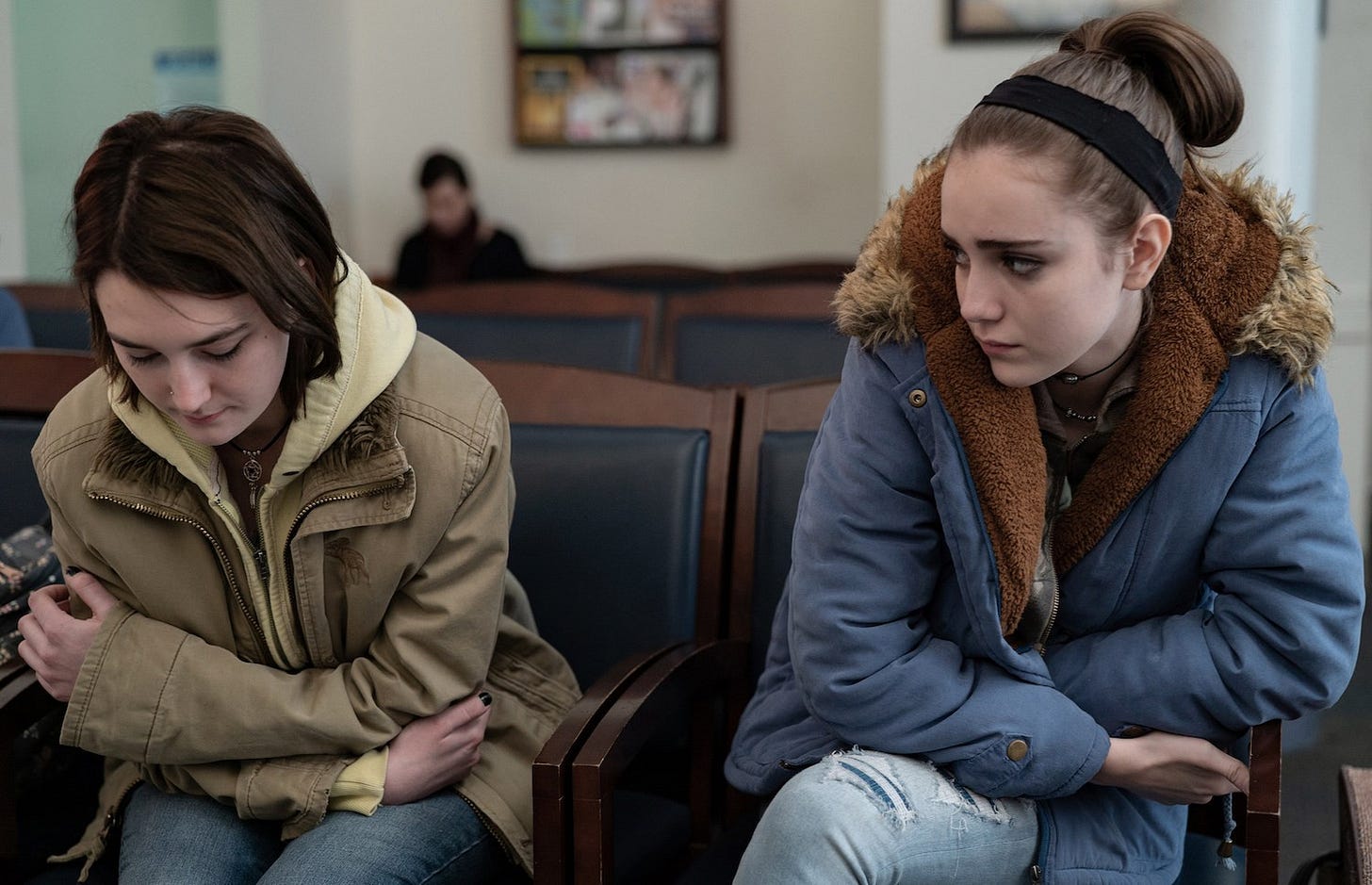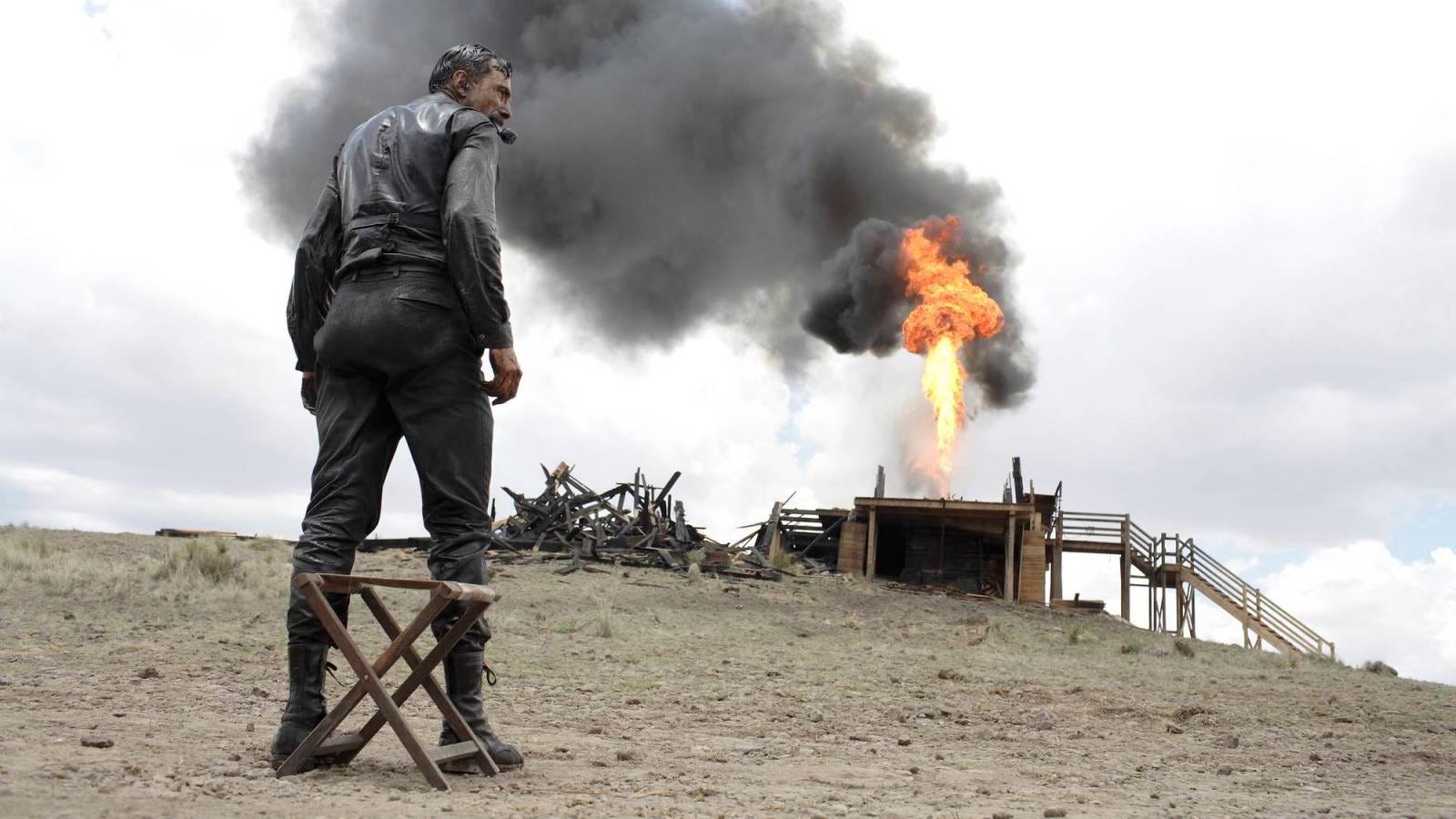Abortion on Film, "There Will Be Blood" Retro-Review (short), and Cannes News
Weekly Reel, May 25
Abortion is in the news, and the feature of many recent, female-driven films. I watched two films since the RvW leak regarding abortion (Happening and Never Rarely Sometimes Always) and one about the Plan B pill (Plan B). The first two are quite serious, no doubt from the subject matter, while the latter is an irreverent buddy comedy closer to Harold & Kumar. What all three show, along with many other recent releases, are stories of young women and teens putting the kibosh on the consequence of an unwanted pregnancy and the constraints of society around them.
Happening, the most recent Biennale Golden Lion winner, was released in American theaters the same week as the RvW leak—was that on purpose or one of the biggest coincidences in film history? The French drama depicts Anne (Anamaria Vartolomei), a bright young university student studying literature, trying to get an abortion in sixties France. Because abortion wasn’t legal until 1975, Anne faces pragmatic, sociocultural pressures instead of moral ones; her friends fail to help because they’re worried about being accomplices to a crime rather than being associated with a “murder.”
Timely doesn’t even begin to describe how relevant the film is. In the trigger law states, this film becomes a documentary. It shows the limitations of ad hoc decision-making against the autonomy of a supposedly equal group of people. It provides the necessary audiovisual depiction of what we’ve all been speaking about theoretically, off-hand. The film also doesn’t shy away from the messiness of DIY abortion and the dilemma of all those around the pregnant woman in a society that keeps the whole issue on the DL.
The film answers the question, “what happened with those women in Grease and Dirty Dancing?” What didn’t happen was a song and dance number.
Happening is out in theaters now.
Plan B is quite different from Happening. It’s a road-trip-esque comedy with high school students Sunny (Kuhoo Verm) and best friend Lupe (Victoria Moroles), traveling intrastate to a planned parenthood. They need to get there before the Plan B pill 24-hour deadline. Sunny lost her virginity to a loser during a house party, the condom stayed in, then came out the next morning. The film doesn’t indicate whether it was enough for the sperm to penetrate the egg’s outer membrane, but they react as if it was a done deal.
Like Anne, Sunny is a gifted student with a promising future. Unlike Sunny, the stakes are relatively low. I wouldn’t say Plan B is a good film, but it provides a necessary counterbalance to the male-dominated buddy films with sexual topics and shows that films about this issue don’t have to be dreary dramas.
Plan B is streaming on Hulu.
Never Rarely Sometime Always, like Plan B, is about a high school student going to the closest Planned Parenthood. Unlike Plan B, Never Rarely film takes pregnancy as seriously as Happening. Like Happening, Never Rarely won a prestigious film festival award, the Berlinale Silver Bear, and enjoyed widespread critical acclaim. It makes sense. Both films are written and directed by women, dealing with an intensely female-related issue that doesn’t shy away from its fuzzy nuances.
Never Rarely is a heartbreaking story of a high schooler’s struggle in a small, conservative town (but not in the hokey, stereotypical way these towns are usually shown). During a social worker’s questioning about her personal relationships (with the possible answers used for the film’s title), it’s revealed that Autumn was physically abused, at the very least. Most likely, that fetus inside her was unwantingly planted through malicious means. Her town only has one clinic for pregnant women, which lies to Autumn about how far along the fetus is to delay her from getting the simpler first trimester abortion. Like Anne in Happening, the place around Autumn conspires against her; but she’s lucky to be a bus ride away from New York in RvW-era America.
Never Rarely Sometime Always is streaming on Freevee.
Because of my lack in inexperience writing about pregnancy and abortion on film, here is a solid, non-clickbaity list of films and episodes about abortion and women’s bodily autonomy from one of my favorite Substack writers.
Retro-Review: There Will Be Blood (2007, Paul Thomas Anderson, USA)
We all know the story. God versus the Devil. The triumph of the latter. The false messiah exposed by the bigger bullshitter; or, the story of how one is always covered in shit. Since Daniel Day-Lewis’s retirement five years ago, the majority regards and remembers his performance as Daniel “Oilman” Plainview as his finest role—step aside, Abe. In an ocean of amazing, mercurial characters, Plainview still galumphs strong across our unconscious. Perhaps that’s the milkshake straw burrowing deeper. The never-ageing Paul Dano also registers his finest performance as the impishly grand Eli Sunday, preacher and faith-healer of Little Boston's Church of the Third Revelation. That Third Revelation, as Sunday failed to predict, turned out to be Plainview, another indicator of his defecatory indifference to faith. The story is as dramatic and dirty as one could get, so I was pleased to find, during a 35mm viewing at Tarantino’s New Beverly Cinema, how hilarious the film is with a crowd.
With every piece of dialogue and eye movement, especially during the interactions between Day-Lewis and Dano, the audience was cracking up. Though Dano is known for having this childlike, shriekingly funny and unsettling acting quality, it rises to the surface faster than Plainview’s oil gushers when Day-Lewis gets his dander up. It’s this quality of Dano’s acting that allows Day-Lewis to play Plainview’s no-nonsense pragmatism to disarm Sunday’s faux evangelism. That and the dry deliveries, eyebrow raises, slaps—not hits, there’s a comedic distinction.
The humor alone, which doesn’t fully come across at home alone, or with several others, makes the price of admission worth it. Added benefits include the soft glow and crinkle of 35mm film running through a projector and watching the effortless contortions Day-Lewis can make with a human face projected two stories tall. Both, in some ways, add a sympathetic bent onto his character that makes him funnier and less demonic.
Since everything about this film has already been said and written—silent opening, Jonny Greenwood’s iconic soundtrack, milkshake, Oscar winning cinematography, confident writing and direction, “I’ve abandoned my child”—I’ll leave this short.
The 75th Cannes began on May 17, some news:
A topless woman, with the Ukrainian flag painted on her chest with the words “stop raping us,” crashed the red carpet. She was protesting the rape and sexual abuse of Ukrainian women by Russian soldiers. She is part of the feminist activist group Scum.
TikTok star, Khaby Lame, made a splash at Cannes as a festival juror. Aside of being an influencer attracting younger generations to Cannes, he says he wants to work in film one day, both in front of and behind the camera.
More women directors than ever in the main Cannes competition, but still only five of 21 films. The festival director pushed back against criticism with a logical, nuanced argument that will go over everyone’s head.
Thank you for once again checking out my Substack. Please like it and use the share button to share it. And don’t forget to subscribe to it.








